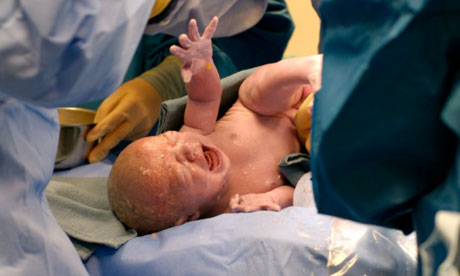
Consultants in the hospital do three or four caesarean sections every day. Occasionally a baby doesn't make it. People think we're like machines and can turn off, but staff will often break down because they're so affected. There is a lot of soul-searching about whether we could have done something different – often the answer is no, but that doesn't stop us wondering.
I'm on every Monday, and do a ward round in the afternoon. A lot of patients have complex maternal medical problems such as cardiac disease or blood clotting disorders, which can affect mother or baby during the pregnancy.
On Tuesday afternoons I do research at the university into pre-eclampsia, a serious disease which causes high blood pressure and can restrict a baby's growth. Every woman who gets pregnant might get the disease; you have to remind the students that's why the research is so important. Wednesday is another research day.
I also teach medical students at Warwick Medical School. The students have all the enthusiasm and lack some of the knowledge, whereas when you get to be a consultant, you have the knowledge but can sometimes lack the enthusiasm. The look on their faces when you deliver a baby and then give it to them to hold is priceless.
Every Thursday the clinical negligence team, of which I am in charge, meets and makes sure the maternity unit is running safely. On Friday, I do my clinic in the morning – it's very busy because they are overbooked – and in the afternoon there are departmental meetings where we plan strategy and address any generic problems.
Last weekend, I was on call. On Saturday I was called in at 4am as someone was bleeding heavily. The doctor had delivered a baby who was fine, but the mother was bleeding from one of her uterine arteries. It's awkward when you walk in, as the patient is awake and they know someone else has been called. You have to introduce yourself but also get on with dealing with the problem. With this it was simple – we just needed an extra pair of hands.
The relationship you have with an obstetrics patient is different to any other as you're making decisions together. You bond very well. There was a lady who had had 10 miscarriages. She came to me and said, "I'm going to give it my last shot." We treated her with a combination of drugs and she managed to have a baby. That feeling of being able to have a positive influence on someone's life is one of the reasons we do it.

